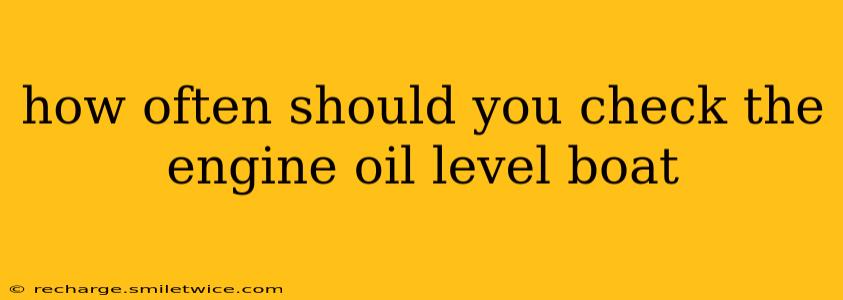Checking your boat's engine oil level is crucial for maintaining its health and preventing costly repairs. Neglecting this simple task can lead to engine damage, decreased performance, and even complete engine failure. But how often should you actually be checking? The answer isn't a single, universally applicable number, but rather a combination of factors. This guide will break down the frequency and importance of regular oil level checks, as well as answer some frequently asked questions.
How Often Should I Check My Boat Engine Oil?
The ideal frequency for checking your boat engine oil depends on several factors:
-
Engine Type: Different engines have different oil consumption rates. Outboard engines, for instance, might consume oil more rapidly than inboard engines, especially during high-speed operation. Consult your owner's manual for specific recommendations tailored to your boat's engine.
-
Usage: If you frequently use your boat, especially at high speeds or under heavy load, you'll need to check your oil level more often. Conversely, if your boat sits idle for extended periods, less frequent checks might suffice.
-
Age of the Engine: Older engines tend to burn more oil than newer ones. Increased frequency of checks is advisable as your engine ages.
-
Oil Type: The type of oil you use can also influence consumption. Synthetic oils generally burn less readily than conventional oils.
General Recommendation: As a general rule of thumb, checking your boat engine oil level before each use is recommended. This is especially important before longer trips or excursions. This proactive approach allows for early detection of any potential problems. If you use your boat less frequently, aim to check the oil level at least once a month, or before any extended period of operation.
What if I Notice Low Oil Level?
If you discover a low oil level, don't panic, but do address it immediately. Before adding oil, identify the cause of the low level. Is there a leak? Is the engine burning excessive oil? Addressing these underlying issues is crucial to preventing future problems. Consult your owner's manual or a qualified marine mechanic for assistance in determining the cause of low oil levels.
How Do I Check My Boat Engine Oil Level?
The process for checking your boat engine oil level varies slightly depending on the type of engine. However, the basic steps are usually similar:
- Ensure the engine is cold: Check the oil level when the engine is cold to ensure accurate reading.
- Locate the dipstick: The dipstick is usually marked with "MIN" and "MAX" levels.
- Remove and wipe the dipstick: Clean the dipstick thoroughly with a clean rag.
- Reinsert and remove again: Reinsert the dipstick fully and remove it again to check the oil level.
- Check the level: The oil level should fall between the "MIN" and "MAX" markings.
What Happens if I Don't Check My Boat Engine Oil Level Regularly?
Neglecting to check your boat's engine oil level can have serious consequences:
- Engine damage: Running an engine with low oil can lead to overheating and significant engine damage, resulting in costly repairs or replacement.
- Reduced performance: Low oil levels can decrease engine performance and affect fuel efficiency.
- Engine seizure: In extreme cases, low oil can cause the engine to seize completely, rendering it unusable.
What type of oil should I use in my boat engine?
The type of oil you should use depends entirely on your engine's manufacturer's recommendations. Consult your owner's manual for the correct oil type, viscosity, and specifications. Using the incorrect oil can damage your engine.
How much oil should I add if the level is low?
Only add the recommended amount of oil as specified in your owner's manual. Overfilling can be just as damaging as underfilling.
When should I change my boat engine oil?
The oil change interval is also specified in your owner's manual and will vary depending on the type of engine and its usage. Generally, more frequent oil changes are recommended for boats used extensively.
By following these guidelines and regularly checking your boat's engine oil level, you can contribute significantly to the longevity and performance of your boat's engine, ensuring many years of safe and enjoyable boating. Remember, prevention is key!
